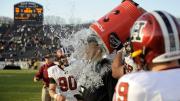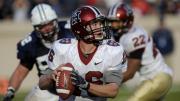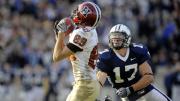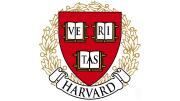The bulldog got stung again in the final minutes of The Game. To football-loving Old Blues, these acts of Harvard waspishness must seem to repeat themselves like a recurring dream.
The archetype is the 1968 game, when Harvard scored 16 points in the last 42 seconds to gain the famous 29-29 tie. In 1974, a 95-yard drive gave the Crimson a 21-16 win with 15 seconds remaining. A year later, with 93 seconds to play, a wobbly field goal won it for Harvard, 10-7. In 1995, Harvard marched downfield in four plays to snatch a 22-21 victory with 29 seconds on the clock. Fast-forward to 2005, when Yale led at halftime, 21-3, only to have Harvard tie the game in the last three minutes and then win it, 30-24, in triple overtime.
Harvard’s 14-10 victory in the 2009 game was another one for the books. Not since 1954 had a Crimson team come back to win The Game after being shut out for three periods.
Yale entered the game as the decided underdog. The Blue had won only two Ivy League games, hadn’t beaten a team with a winning record, and had the league’s poorest rushing statistics. Harvard had lost to Pennsylvania the previous weekend, but had defeated all other Ivy comers and was leading the league in rushing and scoring.
Yet the Eli played like champions for most of the game. On a balmy November day at Yale Bowl, the Blue jumped off to an early 10-0 lead, scoring a 26-yard field goal and a short-yardage touchdown on its first two possessions. Front-line blocking opened hole after hole for sophomore back Alex Thomas, who carried nine times on Yale’s first two drives and finished the game with 124 yards on 26 carries.
“We didn’t think they were going to run on us,” Harvard captain Carl Ehrlich, a defensive tackle, would say after the game. “They came right at us, with a lot of inside runs, and just kept running the ball. They ran hard and blocked hard. They had us on our heels for a long time. We needed to do a lot of regrouping.”
Mixing rushing and passing plays, Harvard’s offense moved the ball well, but couldn’t get into the end zone. Its first drive expired at midfield when junior quarterback Collier Winters fumbled after a 10-yard scramble. A second-period drive ended when Harvard faked a field goal and had an attempted pass batted down by Yale safety Larry Abare. At the start of the second half, a 79-yard drive brought the ball to Yale’s one-yard line, with three chances to punch it in. But a resolute goal-line stand kept Yale’s lead intact.
The Blue had the upper hand until midway through the final period, when Winters handed off to tailback Gino Gordon ’11 on a fourth-and-four at the Harvard 30-yard line. Yale cornerback Adam Money appeared to have Gordon trapped at the line of scrimmage, but he spun away for a 19-yard gain. Gordon’s breakaway changed the flow of the game. Two plays later, Winters threw a high, arching pass to receiver Matt Luft ’10 for a 41-yard touchdown. With less than seven minutes to play, senior Patrick Long’s extra-point kick cut the Eli lead to 10-7.
On Yale’s next series, a holding penalty and a quarterback sack by linemen Ehrlich and John Lyon ’12 forced the Blue into a fourth-and-22 at their own 25-yard line. From punt formation, Yale audaciously tried a trick play, with freshman defensive back John Powers taking the ball on a reverse and sprinting for the sideline behind three blockers. Defenders Collin Zych ’11, Dan Minamide ’12, and Anthony Spadafino ’11 broke through the interference and stopped Powers seven yards short of the first-down marker.
Taking over on Yale’s 40-yard line, the Crimson offense needed only three plays to score again. This time receiver Chris Lorditch raced to the goal line and cosseted a perfectly thrown pass from Winters. The play covered 32 yards and gave Harvard the lead.
The Yale stands, noisily exuberant for most of the game, were now silent.
With 1:32 on the clock, Yale still had time to score. The Blue drove to midfield on a pair of passes by quarterback Patrick Witt, but a third attempt was intercepted by senior linebacker Jon Takamura.
Harvard had no timeouts left, and with half a minute to play Yale got the ball again at its own eight-yard line. But the Crimson’s swarming defense kept the Bulldog at bay.
Head coach Tim Murphy said after the game that he’d given his team a “character check” at halftime. “We were fortunate today,” said Murphy. “But you do get a little more fortunate if you play hard all the time.”
Murphy’s team had been less fortunate at the Stadium a week earlier, when Harvard and Penn contested for Ivy League supremacy. “We take it for granted,” Murphy had said at a preseason press conference, “that the road to the Ivy championship will go through Penn.” In recent years there’s been no alternate route.
If football were geopolitics, Penn and Harvard would be the league’s superpowers. Since the 2000 season, each has won four Ivy titles, and in each of those years the winner of the Harvard-Penn game went on to win the league. Over the last decade, the superpowers have split their match-ups, 5-5, while posting a combined won-lost record of 99-21 against the six other Ivy teams.
Harvard won the Ivy championship outright in 2007, shared it with Brown in 2008, and had hopes of a third consecutive title in 2009. For the fourth time since 2000, both Harvard and Penn had league records of 5-0 when they met on November 14. In a driving rainstorm, the Quakers scored on a 51-yard pass play three minutes into the game, built a 17-0 halftime lead, and emerged with a 17-7 victory.
Road closed.
Penn’s top-ranked defense, which had allowed just 11 points per game, proved superior to a league-leading Harvard offense that had averaged 28 points a game. The lone Harvard score came in the third period, on a 45-yard pass from Winters to Chris Lorditch. With less than three minutes to play, a last Crimson drive put the ball inside Penn’s one-yard line. Winters tried twice to take it in for a score, but the Quaker defense was unyielding. Harvard hadn’t had been held to a single touchdown since the Penn game of 2002 (Penn 44, Harvard 9).
Penn’s win was its first at the Stadium since 2003. The Quakers captured this year’s Ivy title outright with a 34-0 shutout of Cornell one week later. Harvard finished in second place, with Yale settling into a sixth-place tie with Dartmouth.
Harvard has won eight of the last nine meetings with Yale, and has taken five straight at Yale Bowl. That means the Crimson now leads the Blue, 29-24-1, in games played since Ivy League competition was formalized in 1956. Yale still leads the all-time series, 65-53-8.
Tidbits: Tom Williams, Yale’s first-year coach, defended the risky fake-punt call that gave Harvard a short field with two and a half minutes of playing time. “We’re playing to win the football game,” Williams said afterward. “We’ve done it all year. Our whole idea was to keep our foot on the pedal and not play scared.” He noted that Yale had converted two fake punts in earlier games, including one for a touchdown. The real game-changer, said Williams, was Gino Gordon’s 19-yard gain on Harvard’s previous series: “If we make that play, we win.”…A former Stanford linebacker and captain, Williams was an assistant coach for the Jacksonville Jaguars before coming to Yale. At his introductory press conference a year ago, he said his first priority would be to reclaim the Ivy title, which Yale had shared in 2006. “And secondly,” declared Williams, “we’re going to beat Harvard. We’ve got to turn The Game back into a rivalry. It’s been a little one-sided.”
Big leg: Yale’s Tom Mante, the league’s best kicker, punted three times during the game, averaging 51.3 yards per kick and booting a 69-yarder into the end zone at the start of the second quarter.…Mante attempted a 62-yard field goal late in the quarter, but his kick went wide.
Still a few seats left: Attendance at The Game was announced as 52,692. The current capacity of Yale Bowl is 61,446.
Top gun: Junior Collier Winters, in his debut season as a starting quarterback, passed for 15 touchdowns and had the Ivy League’s best passing-efficiency rating, as well as the fewest interceptions (seven) among quarterbacks playing 10 games. In the Yale game Winters completed 19 of 26 passes for 211 yards and two touchdowns, while rushing for 51 yards. For his play at Yale, he was named Ivy League player of the week.…The 77-yard touchdown pass from Winters to Chris Lorditch in Harvard’s 37-3 win over Princeton was the fifth-longest scoring pass in Crimson annals.
Pitch, catch: Lorditch was the team’s premier receiver, with 30 catches for 545 yards and five touchdowns.…Senior Matt Luft wound up his college career with a per-catch average of 16.3 yards, a Harvard record. In 2008, Luft caught 53 passes for 875 yards and five touchdowns. Tightly covered this season, he was held to 17 catches for 214 yards and two touchdowns.
Picks: Linebacker Jon Takamura’s late-game interception against Yale was his fourth of the season. He’d previously made a key interception in Harvard’s 24-21 victory over Brown, and had scored on a 60-yard interception return in the 28-14 win at Lehigh.
Team player: Senior Cheng Ho came to the United States from Taiwan at 12, not speaking English and unfamiliar with football. Harvard’s leading rusher in 2007, he was injured for parts of the 2008 season and was used sparingly this fall. But Ho made the most of his playing time. He rushed for a career-high 132 yards and two touchdowns at Lehigh, and had 73 yards and a touchdown in the final period of the Princeton game. When sidelined, Ho was the team’s most spirited cheerleader. “We could not have won back-to-back championships in 2007 and 2008 without Cheng,” said coach Murphy.
Grind it out: Gino Gordon was the team’s most productive running back, averaging 5.5 yards per carry and leading the league in yardage (632) and touchdowns (eight).…In Harvard’s 42-21 win over Dartmouth, Gordon rushed for 119 yards and three touchdowns, and caught four passes for 103 yards. No Crimson player had ever broken the century mark twice in one game, as both rusher and receiver.…Freshman Treavor Scales, alternating with Gordon at tailback, rushed for 120 yards and two touchdowns against Dartmouth. Not since 1999 had two Crimson backs rushed for 100 yards or more in the same game.
All-Ivies: Gordon, a second-team all-Ivy selection in 2008, made the first team in 2009, as did offensive tackle James Williams ’10, guard Ben Sessions ’10, and defensive backs Collin Zych and Derrick Barker ’10. Williams was also a first-team selection in 2007 and 2008. Fourteen other team members, including Ehrlich, Long, Lorditch, Scales, Takamura, and Winters, earned second-team or honorable mention citations. Scales was also named Ivy rookie of the year.…Zych, of Plano, Texas, and Kirkland House, will captain the 2010 team. The winner of this year’s Crocker Award as the team’s most valuable player, Zych made a team-high 73 tackles and led the Ivy League with 12 pass breakups and 14 passes defended. He helped force the decisive tackle on Yale’s pivotal fake punt in the fourth quarter of The Game.
Streaking: Crimson teams have now won seven or more games in each of the past nine seasons—an Ivy League record, and Harvard’s best nine-year run since the seasons of 1902–1910.











